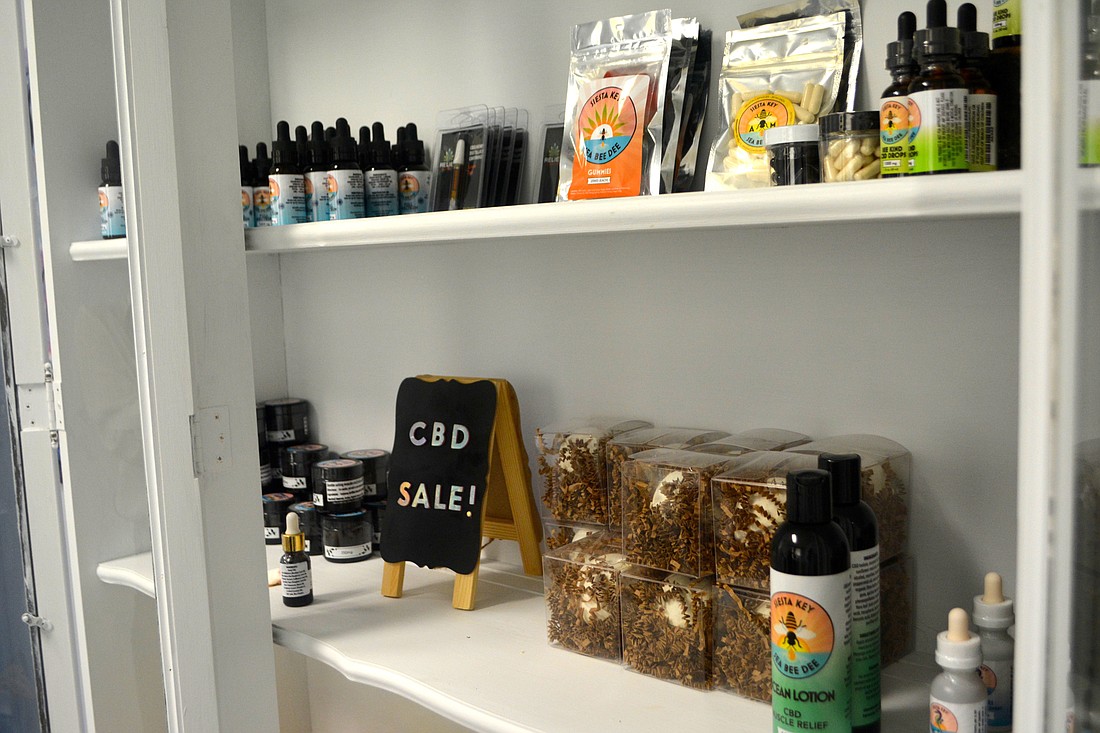- December 18, 2024
-
-
Loading

Loading

Health fads may come and go like the tide but, lately, one trend has remained prominent due to its hazy legal status: CBD.
A hemp product that is considered marijuana’s cousin, many people have been turning to the cannabinoid to mollify a variety of ailments. But, considering the legal limbo CBD currently faces in the state of Florida, why wouldn’t somebody simply turn to traditional prescriptions instead?
“I think people are tired of being jerked around,” said Katie Starling, owner of local CBD company Siesta Key Sea Bee Dee. “Like, half the time they prescribe something that doesn’t work ... So, I think this is more of wanting something better than that for themselves, their future and their families.”
But educating oneself on a product that is clouded by legal jargon and technicalities may not be the easiest thing to do. To answer some of the most commonly asked questions concerning these products, we turned to two local CBD owners and entrepreneurs: Shelby Isaacson, the owner of Second and Seed Neighborhood Apothecary, and Katie Starling of Siesta Key Sea Bee Dee.
Isaacson: It is a cannabinoid found in industrial hemp. So, hemp is the sister plant to marijuana. It is non-psychoactive, so you’re not going to get the high, but you are going to get the medicinal properties.
Starling: CBD can be an isolate or come in a full-spectrum form. Isolate is made from the whole plant’s extract, and then they isolate the CBD out of that extraction. Meanwhile, full-spectrum is the whole entire plant extract, and that has all of the cannabinoids, including trace amounts of THC.
Isaacson: Hemp does not heal you, and that is one major misconception out there. It actually helps your body heal itself by helping it go back to homeostasis (a state of internal equilibrium of the body’s systems). Ultimately, it’s food, and your body is going to absorb whatever your body needs to absorb.
Starling: THC gets you high and can make you feel euphoric. CBD, however, is non-psychoactive and targets inflammation. They can work well together, but not everybody responds well to THC ... You can find relief from CBD all by itself without the uncomfortable effects of being high or groggy or drowsy.
Isaacson: It has a broad range of uses. Probably the most popular reasons people come in are for chronic pain, inflammation, anxiety and sleep, because it helps to calm that monkey-mind that keeps you going all night long. We also have people coming in to help treat their cancer, chronic migraines and autism. It really helps with a wide variety of conditions.
Starling: Not right now. For marijuana, you’d have to go to a dispensary, but for CBD you don’t.
Isaacson: It is federally legal ... Now, state laws can be different and city laws can be different. It’s not legal in Florida, but we have support from the State Attorney’s Office that says, ‘We’re not going to do anything.’ The county [of Sarasota] isn’t worried about it. But the city did come out and say they were going to do some cease-and-desist letters, and I was really upset that they were lumping this shop in with gas stations and sex shops.
Starling: You need to make sure you’re going to somebody that’s trusted, or maybe find [a CBD provider] through a friend. Make sure your company has their lab results provided. You don’t want to buy CBD from a gas station … You want to go somewhere that’s more of a wellness setting where they might have some education provided for you. It’s important to always have your lab results as a CBD company, and it’s good to have your products tested from a Florida company.
Isaacson: Dosing is kind of that million-dollar question in the industry because of the fact that you and I could eat the same salad for lunch and I could be hungry again at 1 p.m. and you could be hungry at 1:30 p.m. Our bodies metabolize it differently. We always say less is more.
Starling: You might feel better, and not everybody is used to feeling better. But, otherwise, you might have some medication interactions. You’ll definitely want to consult with your doctor before that. Do your research. But, other than that, it’s not an addictive substance.
Isaacson: A quality CBD product typically starts around $75 and can go as high as $400.
Starling: Our price range starts with basic tinctures at $50 and then go all the way up to $180. You can start at $25 and go up to a couple hundred dollars.